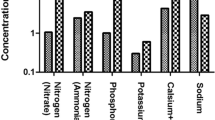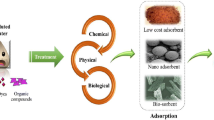Abstract
The research conducts a life cycle assessment (LCA) on wastewater treatment (WWT) methods—membrane bioreactor (MBR), soil biotechnology (SBT), and bio-electrochemical constructed wetlands (BCW)—in comparison with the conventional activated sludge process (ASP). Employing SimaPro v9.5 with a cradle-to-gate system boundary, the analysis utilizes the IMPACT 2002 + method, employing per cubic meter of treated wastewater as the functional unit. The analysis shows that SBT exhibits the lowest environmental impacts among the considered WWT methods. The global warming potential was 0.0996 kg CO2 eq. for SBT, 1.33 kg CO2 eq. for MBR, 0.131 kg CO2 eq. for BCW, and 0.544 kg CO2 eq. for ASP. BCW demonstrates a 75.91% decrease, while MBR exhibits a 144.48% increase compared to ASP. Notably, electricity consumption emerges as the primary contributor to environmental impact in MBR and ASP. The resource impact category varies with a 138.15% increase in MBR and an 83.41% decrease in SBT compared to ASP. Additionally, the research indicates that the high human health impact observed in MBR results mainly from increased carcinogens (0.00176 kg C2H3Cl eq.), non-carcinogens (0.01 kg C2H3Cl eq.), and ionizing radiation (3.34 Bq C-14 eq.). The findings underscore the importance of considering treatment efficiency and broader environmental implications in selecting WWT methods. As the world emphasizes sustainability, such LCA studies provide valuable insights for making informed decisions in wastewater management.










Similar content being viewed by others
Data availability
Data will be made available on request.
References
Bulle, C., Margni, M., Patouillard, L., et al. (2019). IMPACT World+: A globally regionalized life cycle impact assessment method. International Journal of Life Cycle Assessment, 24, 1653–1674. https://doi.org/10.1007/s11367-019-01583-0
Cañote, S. J. B., Barros, R. M., Lora, E. E. S., et al. (2021). Life cycle assessment of upflow anaerobic sludge blanket sludge management and activated sludge systems aiming energy use in the municipality of Itajubá, Minas Gerais, Brazil. J Mater Cycles Waste Manag, 23, 1810–1830. https://doi.org/10.1007/s10163-021-01253-0
CPCB. (2021). National inventory of sewage treatment plants. Central Pollution Control Board. https://cpcb.nic.in/openpdffile.php?id=UmVwb3J0RmlsZXMvMTIyOF8xNjE1MTk2MzIyX21lZGlhcGhvdG85NTY0LnBkZg==
DESA. (2022). United nations department of economic and social affairs, population division (2022) World population prospects 2022: Summary of results. UN DESA/POP/2022/TR/NO. 3.
Fang, Y. K., Wang, H. C., Fang, P. H., et al. (2023). Life cycle assessment of integrated bioelectrochemical-constructed wetland system: Environmental sustainability and economic feasibility evaluation. Resources, Conservation and Recycling, 189, 106740. https://doi.org/10.1016/j.resconrec.2022.106740
Gao, Y., Zhang, W., Gao, B., et al. (2018). Highly efficient removal of nitrogen and phosphorus in an electrolysis-integrated horizontal subsurface-flow constructed wetland amended with biochar. Water Research, 139, 301–310. https://doi.org/10.1016/j.watres.2018.04.007
Garfí, M., Flores, L., & Ferrer, I. (2017). Life Cycle Assessment of wastewater treatment systems for small communities: Activated sludge, constructed wetlands and high rate algal ponds. Journal of Cleaner Production, 161, 211–219. https://doi.org/10.1016/j.jclepro.2017.05.116
Garg, S. K. (2021). Environmental engineering (Vol. II) sewage waste disposal and air pollution engineering (40th ed.). Khanna Publishers.
Garg, R., & Singh, S. K. (2022). Treatment technologies for sustainable management of wastewater from iron and steel industry — A review. Environmental Science and Pollution Research, 29, 75203–75222. https://doi.org/10.1007/s11356-022-23051-3
Glover, C. J., Phillips, J. A., Marchand, E. A., & Hiibel, S. R. (2022). Modeling and life cycle assessment of a membrane bioreactor–membrane distillation wastewater treatment system for potable reuse. Separations, 9(6), 151. https://doi.org/10.3390/separations9060151
Hao, X., Wang, X., Liu, R., et al. (2019). Environmental impacts of resource recovery from wastewater treatment plants. Water Research, 160, 268–277. https://doi.org/10.1016/j.watres.2019.05.068
Ioannou-Ttofa, L., Foteinis, S., Chatzisymeon, E., & Fatta-Kassinos, D. (2016). The environmental footprint of a membrane bioreactor treatment process through life cycle analysis. Science of the Total Environment, 568, 306–318. https://doi.org/10.1016/j.scitotenv.2016.06.032
ISO. (2006a). ISO - ISO 14044:2006 - Environmental management — Life cycle assessment — Requirements and guidelines. In: International Organization for Standardization (ISO). https://www.iso.org/standard/38498.html. Accessed 5 Oct 2022.
ISO. (2006b). ISO - ISO 14040:2006 - Environmental management — Life cycle assessment — Principles and framework. In: International Organization for Standardization (ISO). https://www.iso.org/standard/37456.html. Accessed 5 Oct 2022.
Jones, E. R., van Vliet, M. T. H., Qadir, M., & Bierkens, M. F. P. (2021). Country-level and gridded estimates of wastewater production, collection, treatment and reuse. Earth Syst Sci Data, 13, 237–254. https://doi.org/10.5194/essd-13-237-2021
Kalbar, P. P., Karmakar, S., & Asolekar, S. R. (2013). Assessment of wastewater treatment technologies: Life cycle approach. Water and Environment Journal, 27, 261–268. https://doi.org/10.1111/wej.12006
Kamble, S. J., Chakravarthy, Y., Singh, A., et al. (2017). A soil biotechnology system for wastewater treatment: Technical, hygiene, environmental LCA and economic aspects. Environmental Science and Pollution Research, 24, 13315–13334. https://doi.org/10.1007/s11356-017-8819-6
Kamble, S., Singh, A., Kazmi, A., & Starkl, M. (2019). Environmental and economic performance evaluation of municipal wastewater treatment plants in India: A life cycle approach. Water Science and Technology, 79, 1102–1112. https://doi.org/10.2166/wst.2019.110
Kulak, M., Shah, N., Sawant, N., et al. (2017). Technology choices in scaling up sanitation can significantly affect greenhouse gas emissions and the fertiliser gap in India. Journal of Water, Sanitation and Hygiene for Development, 7, 466–476. https://doi.org/10.2166/washdev.2017.005
Liu, F., Fan, J., Du, J., et al. (2019). Intensified nitrogen transformation in intermittently aerated constructed wetlands: Removal pathways and microbial response mechanism. Science of the Total Environment, 650, 2880–2887. https://doi.org/10.1016/j.scitotenv.2018.10.037
Luthy, R. G., Sedlak, D. L., Plumlee, M. H., et al. (2015). Wastewater-effluent-dominated streams as ecosystem-management tools in a drier climate. Frontiers in Ecology and the Environment, 13, 477–485. https://doi.org/10.1890/150038
Lutterbeck, C. A., Kist, L. T., Lopez, D. R., et al. (2017). Life cycle assessment of integrated wastewater treatment systems with constructed wetlands in rural areas. Journal of Cleaner Production, 148, 527–536. https://doi.org/10.1016/j.jclepro.2017.02.024
McDonald, R. I., Weber, K., Padowski, J., et al. (2014). Water on an urban planet: Urbanization and the reach of urban water infrastructure. Global Environmental Change, 27, 96–105. https://doi.org/10.1016/j.gloenvcha.2014.04.022
Mehta, P. (2012). Impending water crisis in India and comparing clean water standards among developing and developed nations. Archives of Applied Science Research, 1, 497–507. https://www.scholarsresearchlibrary.com/articles/impending-water-crisis-in-india-and-comparing-clean-waterstandards-among-developing-and-developed-nations.pdf
NITI Aayog. (2022). Urban wastewater scenario in India. Government of India. Available online: https://www.niti.gov.in/sites/default/files/2022-09/Waste-Water-A4_20092022.pdf
Odedishemi Ajibade, F., Wang, H.-C., Guadie, A., et al. (2021). Total nitrogen removal in biochar amended non-aerated vertical flow constructed wetlands for secondary wastewater effluent with low C/N ratio: Microbial community structure and dissolved organic carbon release conditions. Bioresource Technology, 322, 124430. https://doi.org/10.1016/j.biortech.2020.124430
Patel, K., & Singh, S. K. (2022a). A life cycle approach to environmental assessment of wastewater and sludge treatment processes. Water and Environment Journal, 36, 412–424. https://doi.org/10.1111/wej.12774
Patel, K., & Singh, S. K. (2022b). Assessing the sustainability of municipal solid waste management using life-cycle analysis. Proceedings of the Institution of Civil Engineers - Waste and Resource Management, 175, 64–74. https://doi.org/10.1680/jwarm.21.00018
Patel, K., & Singh, S. K. (2023a). Environmental sustainability analysis of biofuels: A critical review of LCA studies. Clean Technologies and Environmental Policy, 25(8), 2489–2510. https://doi.org/10.1007/s10098-023-02596-y
Patel, K., & Singh, S. K. (2023b). Assessing the sustainability of Jatropha and rapeseed biodiesel: An LCA approach. In R. Al Khaddar, S. K. Singh, & N. D. Kaushika (Eds.), Recent developments in energy and environmental engineering (pp. 191–200). Springer Nature Singapore. https://doi.org/10.1007/978-981-99-1388-6_15
Postacchini, L., Lamichhane, K. M., Furukawa, D., et al. (2016). Life cycle assessment comparison of activated sludge, trickling filter, and high-rate anaerobic-aerobic digestion (HRAAD). Water Science and Technology, 73, 2353–2360. https://doi.org/10.2166/wst.2016.087
Rahman, T. U., Roy, H., Islam, M. R., et al. (2023). The advancement in membrane bioreactor (MBR) technology toward sustainable industrial wastewater management. Membranes, 13(2), 181. https://doi.org/10.3390/membranes13020181
Resende, J. D., Nolasco, M. A., & Pacca, S. A. (2019). Life cycle assessment and costing of wastewater treatment systems coupled to constructed wetlands. Resources, Conservation and Recycling, 148, 170–177. https://doi.org/10.1016/j.resconrec.2019.04.034
Sharma, A. K., Tjandraatmadja, G., Cook, S., & Gardner, T. (2013). Decentralised systems – Definition and drivers in the current context. Water Science and Technology, 67, 2091–2101. https://doi.org/10.2166/wst.2013.093
Singh, N. K., & Kazmi, A. A. (2018). Performance and cost analysis of decentralized wastewater treatment plants in Northern India: Case study. Journal of Water Resources Planning and Management, 144(3). https://doi.org/10.1061/(ASCE)WR.1943-5452.0000886
Singh, N. K., Banyal, P., & Kazmi, A. A. (2016). Nature Environment and Pollution Technology an international quarterly scientific journal techno-economic assessment of full scale MBBRs treating municipal wastewater followed by different tertiary treatment strategies: A case study from India. Nature Environment and Pollution Technology, 15, 1311–1316.
Singh, N. K., Singh, R. P., & Kazmi, A. A. (2017). Environmental impact assessment of a package type IFAS reactor during construction and operational phases: A life cycle approach. Water Science and Technology, 75, 2246–2256. https://doi.org/10.2166/wst.2017.110
Singh, R. P., Singh, N. K., & Kazmi, A. A. (2020). Environmental sustainability assessment of a fixed media based and package type integrated fixed-film activated sludge reactor in India: A damage-oriented approach. Journal of Cleaner Production, 250, 119438. https://doi.org/10.1016/j.jclepro.2019.119438
Tabesh, M., Feizee Masooleh, M., Roghani, B., & Motevallian, S. S. (2019). Life-cycle assessment (LCA) of wastewater treatment plants: A case study of Tehran Iran. International Journal of Civil Engineering, 17, 1155–1169. https://doi.org/10.1007/s40999-018-0375-z
Teo, C. J., Karkou, E., Vlad, O., et al. (2023). Life cycle environmental impact assessment of slaughterhouse wastewater treatment. Chemical Engineering Research and Design, 200, 550–565. https://doi.org/10.1016/j.cherd.2023.11.016
Tillman, A.-M., Svingby, M., & Lundström, H. (1998). Life cycle assessment of municipal waste water systems. International Journal of Life Cycle Assessment, 3, 145–157. https://doi.org/10.1007/BF02978823
WWAP. (2017). Wastewater: The untapped resource: The United Nations World Water Development Report, 2017. https://www.unep.org/resources/publication/2017-un-world-water-development-report-wastewater-untappedresource
Zhang, C., Quan, B., Tang, J., et al. (2023). China’s wastewater treatment: Status quo and sustainability perspectives. Journal of Water Process Engineering, 53, 103708. https://doi.org/10.1016/j.jwpe.2023.103708
Author information
Authors and Affiliations
Contributions
Ritesh Kumar and Kulvendra Patel are responsible for the conception, acquisition, analysis, and drafting of the manuscript. S. K. Singh has helped in supervising the work, data interpretation, and review of the manuscript. All authors read and approved the final manuscript.
Corresponding author
Ethics declarations
Competing interests
The authors declare no competing interests.
Additional information
Publisher's Note
Springer Nature remains neutral with regard to jurisdictional claims in published maps and institutional affiliations.
Rights and permissions
Springer Nature or its licensor (e.g. a society or other partner) holds exclusive rights to this article under a publishing agreement with the author(s) or other rightsholder(s); author self-archiving of the accepted manuscript version of this article is solely governed by the terms of such publishing agreement and applicable law.
About this article
Cite this article
Kumar, R., Patel, K. & Singh, S.K. Biological wastewater treatment: a comprehensive sustainability analysis using life cycle assessment. Environ Monit Assess 196, 416 (2024). https://doi.org/10.1007/s10661-024-12578-2
Received:
Accepted:
Published:
DOI: https://doi.org/10.1007/s10661-024-12578-2




